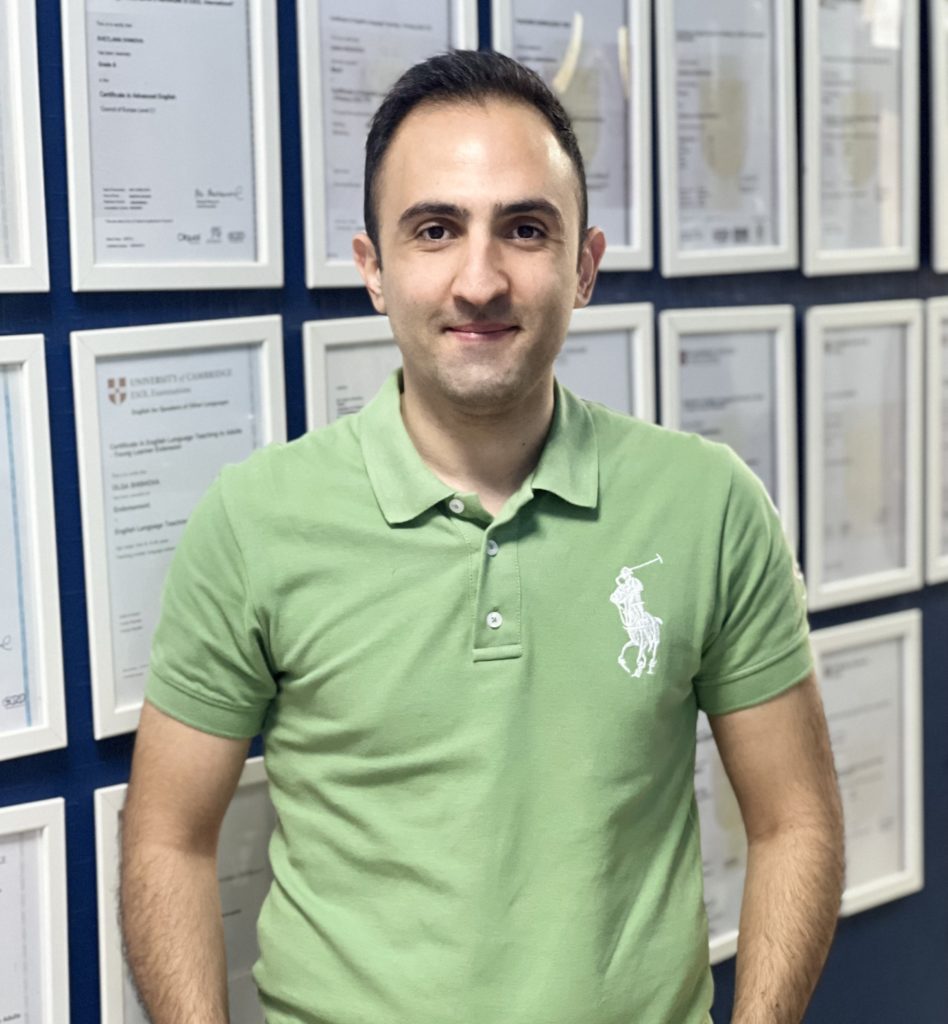
Course requirements:
Age: 18+
Level: B2 or above
Course format:
100% online
Price:
25.000₽
Duration:
12 weeks
Course start: 13/01/24
This course will change you and the way you teach. We will teach you how to make the learning process as effective and interesting as possible for your students.
The Teacher Training Course provides an opportunity to explore modern teaching methodologies, as well as analyze current teaching ideas. Emphasis will be placed on practical classroom work and work on student motivation, which will help improve your teaching methods. You will compare different teaching styles and methods, as well as contrast the differences in approaches found in the teaching profession internationally.
Interactive
learning format
Practical tasks
Teachers –
practitioners
specialists, Delta and CELTA tutors.
Modern techniques and teaching tools
Skills adapted according to the requirements of companies and the modern labor market
Who is this course for?
For those just starting their journey into teaching.
You will learn how to properly transfer your knowledge and love for the language to other people. Gain all the skills you need to make teaching your life’s work.
For those who want to develop in the profession and upgrade their hard-skills.
Learn how to competently build, plan your lessons, work with different groups of students and meet international teaching standards.
Why do teachers improve their qualifications with us?
Our centres have highly qualified tutors who have already trained hundreds of students and held dozens of sessions all over the world!
Get trained anywhere you have internet
At the end of the online course, each student is issued a corresponding certificate.
Our results:
For more than 11 years Teacher Training centre has provided professional training for teachers in the South of Russia. We pay a lot of attention to the quality of teaching and service – and positive feedback from our trainees proves that. Teachers from 18 different countries have already been trained up in our centre. Our tutors are highly qualified professionals with extensive experience in teacher training.
work
DELTA diploma
CELTA certificate

Сourse program:
Classroom practices-approaches, methods, techniques.
You will get acquainted with modern approaches to teaching English, like the Grammar Translation Method, Direct Method, Audio-Lingual Method, Silent Way, Community Language Learning and many others. Learn their dignity and implementation. Consider the possibility of using them in different cases and the justification for using them.
Classroom management.
In this lesson, you will learn how to properly and effectively organize work in an English lesson:
– position of the teacher during the lesson,
– The role of the teacher in the classroom
– how to give instructions for tasks in English,
– the beginning of the lesson (how to interest students, arouse interest in the topic being studied)
Interaction patterns. Organizing pair and group work. Different seating arrangements.
You will get acquainted with the organization of group, pair, individual work in an English lesson. You will understand in practice the arrangement of chairs and desks, depending on the type of work. Discuss their disadvantages and advantages.
Lessons planning. 20 ways to ruin a lesson.
Consider the need for lesson planning and its most effective structure. You will learn how to correctly formulate the goals and objectives of the lesson, choose the appropriate means to achieve these goals. You will also learn what problems you may encounter in the lesson, how to anticipate them and find solutions. And also learn how to effectively plan the time of the lesson and the time for completing assignments.
Learners vs. Teachers. Motivating learners
Consider the types of students` motivation and ways to stimulate interest in a foreign language. Let’s analyze different types of tasks from the point of view of the motivating factor.
Grammar: How to present and practice grammar. Text based/ situation based
You will learn different ways of presenting and practicing grammar material. Get acquainted with the features of the presentation of grammatical material, using a text or a situation.
Grammar. Guided discovery
Consider the difference between deductive and inductive approaches, their advantages and disadvantages. You will understand what works better: the teacher explains the rules or the students formulate them themselves.
Functions
Familiarize yourself with a curriculum based on functional language. Consider the features of presenting and practicing a functional language.
Pronunciation: Individual sounds
Get to know the sound system in English. Consider different ways of working with sounds.
Pronunciation: Sentence stress / intonation
Find out which words are usually stressed or unstressed in a sentence. Consider the types of stress in a sentence, as well as the intonation pattern of different types of sentences. Learn the functions of intonation.
Pronunciation: Features of connected speech
Get to know the features of connected speech. Consider various exercises to practice the characteristic features of coherent speech.
How to teach vocabulary
Let’s get acquainted with the main approaches to teaching vocabulary in the modern methodology and find out their advantages and disadvantages. We will learn how to work with the lexical approach and analyze its advantages. See the different kinds of tasks used in the lexical approach. Consider different ways of presenting vocabulary and types of exercises to practice vocabulary.
How to teach vocabulary. The Lexical Approach
Get to know the lexical approach and learn its benefits. Consider the typical types of tasks used in the lexical approach.
Developing reading skills.
Get acquainted with different types of reading (viewing, detailed, etc.) and understand the dependence of the type of reading on the type of task. Consider the main stages of reading in the lesson (before reading the text, during reading and after reading), various types of tasks at different stages of reading, and also analyze the text and tasks for it in terms of goals and objectives, relevance to the topic, level of complexity.
Developing reading skills. The use of graded readers
Find out why it is necessary to use adapted books to enrich students’ vocabulary. Consider different types of book activities in class and different ways to increase students’ interest in reading in English.
Developing listening skills: subskills
Recognize and analyze the complexities of listening. Consider the stages of listening (preparation, listening, tasks after listening). You will understand why preparatory work is necessary before listening to the text. Consider a series of exercises corresponding to each stage of listening.
Listening for comprehension vs listening for perception
Get to know the differences between listening as a test and skill building, as well as listening strategies. Learn how phonetics is related to listening.
Developing writing skills. Product writing
Consider different types of writing and ways to increase student engagement in writing assignments. Get to know different types of exercises for preparing and completing a written assignment.
Writing. Process writing
Consider the difference between writing as a product and as a process. Consider the stages of the “writing as a process” lesson.
Organizing speaking activities. Speaking for fluency vs. speaking for accuracy
In this step, you will be introduced to different approaches to learning to speak. Review and analyze a series of exercises aimed at developing speaking skills.
Roleplays and storytelling
Learn how best to use language games in an English lesson. Consider the classification of language games, the advantages and disadvantages of using games in the process of teaching vocabulary and grammar. Understand the need to use games to increase student motivation.
Error correction and feedback
In this module, you will learn about the various error correction methods, their advantages and disadvantages. You will understand when and how, during the lesson it is better to correct mistakes. Consider the causes of different types of errors.
How to teach Young learners
Get acquainted with the features of teaching the language of children and adolescents. You will learn the basic techniques of managing a children’s audience. For those who want to engage in teaching children, it is worth paying attention to the course Young Learners Course
Testing and assessment
Consider different types of tests. Learn how often students should be tested and learn about alternative methods of testing.
Test – Teach – Test vs TBL
Discuss the features of the two approaches, their advantages and disadvantages. Find out which approach to choose for low and high levels.
At the end of the course, you write the final test and provide a portfolio of completed course assignments.
Frequently asked questions
Teacher Training Course Online is an online training course that includes a mandatory practical independent part.
12 weeks
To enroll in the course, you must be at least 18 years old, the level of English is not lower than B2
The results of the students’ work are evaluated continuously throughout the course. Particular attention is paid to the disclosure of teaching potential. Upon completion, students who successfully complete the course receive a certificate from our center.
- You work with a number of interactive materials based on sections of the curriculum. You work on these tasks independently or in a group and get help, evaluation, and comments from your tutor.
To successfully complete the course and receive a certificate, you need to: view all classes, write a final test and provide a portfolio of completed course assignments.

Tutors of the course:

Rahimi
In addition, a team of experienced and professional tutors with international certificates (CELTA, DELTA, TKT, CELT-P\S, IELTS, etc.) takes part in conducting this course.
Leave a request for a consultation
Отправляя данные, вы соглашаетесь с Политикой Конфиденциальности сайта



